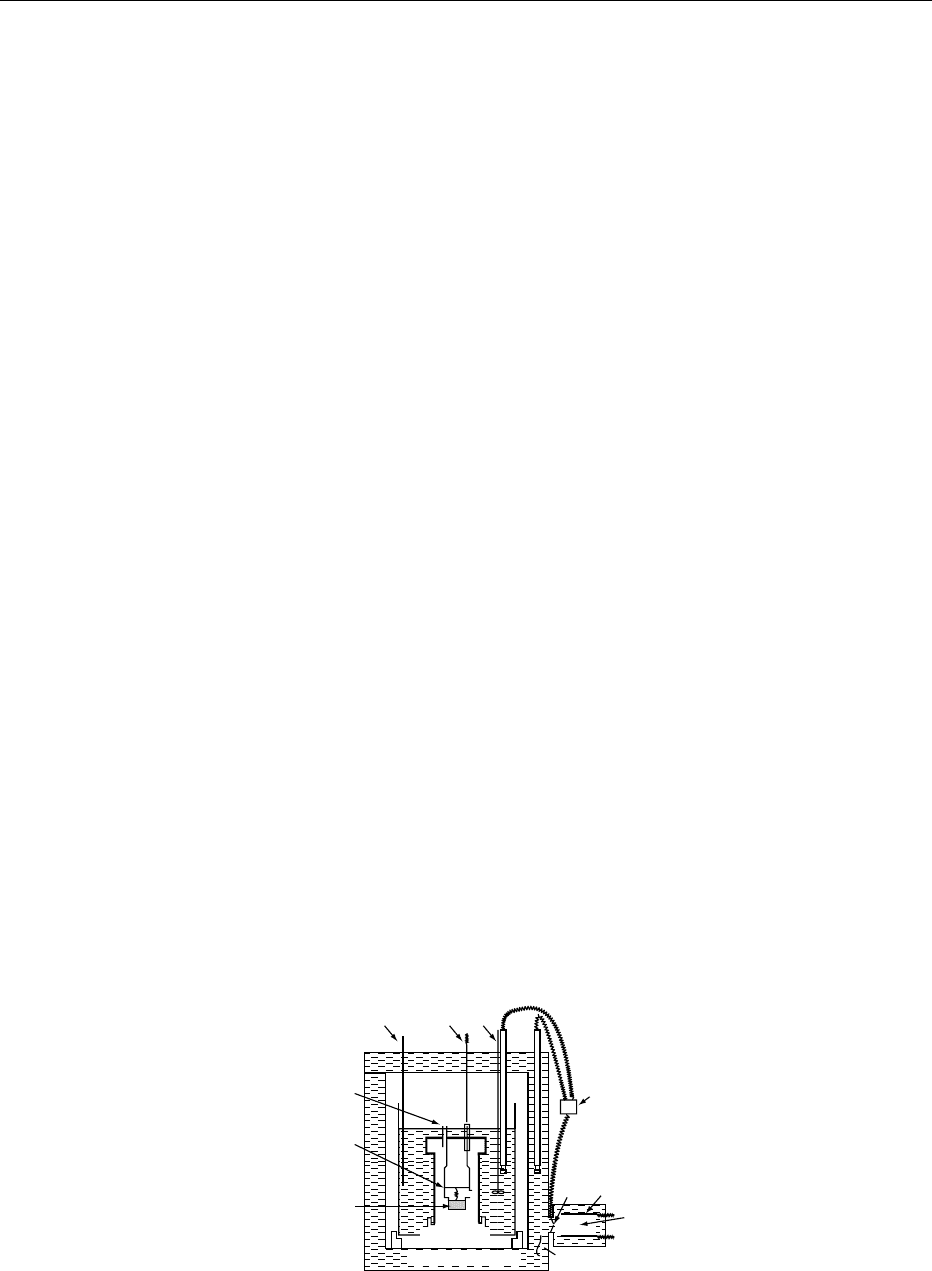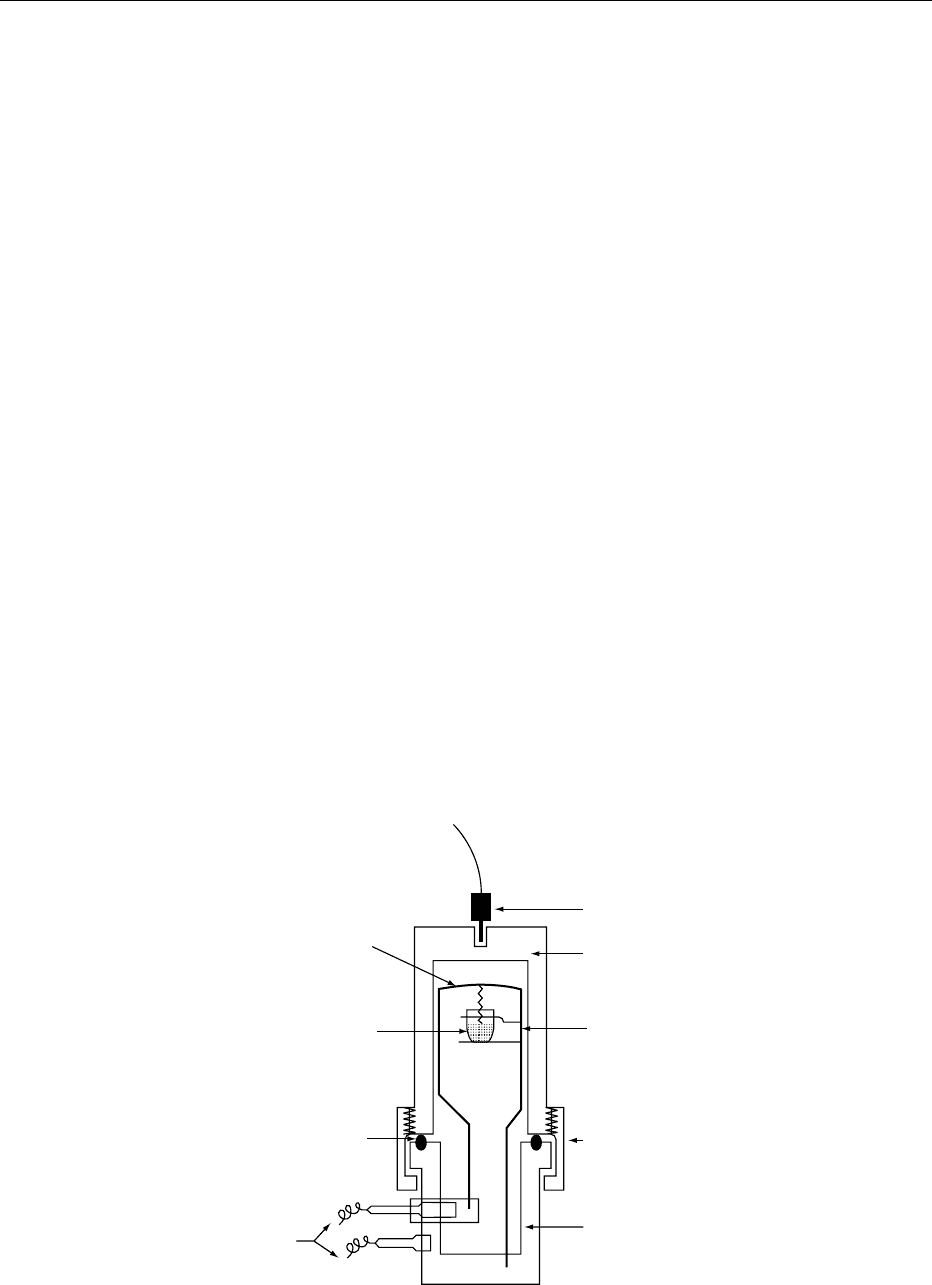Caballero B. (ed.) Encyclopaedia of Food Science, Food Technology and Nutrition. Ten-Volume Set
Подождите немного. Документ загружается.


ENERGY
Contents
Measurement of Food Energy
Intake and Energy Requirements
Measurement of Energy Expenditure
Energy Expenditure and Energy Balance
Measurement of Food Energy
J C Brown, AFRC Institute of Food Research,
Norwich, UK
This article is reproduced from Encyclopaedia of Food Science,
Food Technology and Nutrition, Copyright 1993, Academic Press.
Background
0001 The accurate assessment of the energy value of foods
and diets is essential for the study of energy metabol-
ism and energy balance, and for dealing with prob-
lems of malnutrition and obesity. Whereas the body
oxidizes the constituents of food in the process of
metabolism, the bomb calorimeter determines the
energy released as a result of direct oxidation of the
food constituents, and so enables measurement of an
energy value. The energy value obtained is the heat of
combustion, which is the maximum potential energy
present in the food and is called its gross energy. The
gross energy makes no allowance for losses of energy,
owing to incomplete digestion or during metabolism.
0002 In nutritional studies, the energy values used are for
metabolizable energy, which is the energy available to
the body from food. These values are usually calcu-
lated using energy conversion factors applied to the
fat, protein, and carbohydrate content of a food, and
take into account the average energy losses in feces
and urine. For greater accuracy, normal losses of
energy to feces and urine can be deducted from the
gross energy, which is determined by bomb calorim-
etry, to give a metabolizable energy. In more precise
studies the metabolizable energy value is measured,
rather than calculated, by determining these energy
losses directly.
Principles of Bomb Calorimetry for the
Determination of Energy Values of Foods
0003 The principle that allows the determination of energy
value using bomb calorimetry is based on the first law
of thermodynamics. Implicit in this law is the finding
termed ‘the law of constant heat summation,’ which
appeared in a paper published by G.H. Hess in 1838.
Hess showed that the heat produced in a given
chemical reaction was always the same, regardless
of the intermediate steps.
0004The major sources of energy in foods are the
organic constituents fat, carbohydrates, and protein,
with smaller contributions from alcohol, organic
acids, and traces of other organic materials such as
mineral oils. The foods are completely oxidized in the
bomb calorimeter, to yield the end products: carbon
dioxide, water, oxides of nitrogen and sulfur, and
heat. In the process of bomb calorimetry, the sample
is rapidly combusted in oxygen at increased pressure,
and the heat production is measured. The apparatus
is calibrated with benzoic acid, a thermochemical
standard, and a heat of combustion is derived for
the food.
0005Occasionally, when an absolute measurement of
heat of combustion is required, corrections are ap-
plied to the result obtained, e.g., for (1) sulfuric acid
production from sulfur in the sample, (2) nitric acid
production present in the bomb during combustion,
and (3) departures from the standard state, pressure,
or temperature of reactants or products. For the
purposes of determining the energy values of foods
or biological samples, the above corrections are
normally sufficiently small to be ignored.
Types of Equipment Used
0006There are two different types of bomb calorimeter
currently in use: the adiabatic (without gain or loss
of heat) and the ballistic. The adiabatic bomb is
favored for accurate nutritional studies. The ballistic
bomb gives more rapid determinations but with a
lower accuracy.
Development of the Adiabatic Bomb Calorimeter
0007The structure and operation of all bomb calorimeters,
from the earliest (dated around 1900) to those cur-
rently in use, are similar. The bomb chamber in which
combustion of the sample takes place is typically
made from noncorroding steel and submerged in a
water-filled calorimeter vessel. The water is continu-
ously stirred and its temperature recorded, before and
ENERGY/Measurement of Food Energy 2087

after it rises as a result of heat produced by the com-
bustion of the fuel. With the early designs of bomb
calorimeter, it was necessary to determine a cooling
correction, since some of the heat generated during
the combustion was lost to surrounding air. Assess-
ment of cooling correction involved the recording of
accurate temperature observations made at precise
time intervals, commencing at least 5 min before
firing and continuing until at least 5 min after a con-
stant rate of temperature change is resumed.
0008 Major developments in bomb calorimeter design
were concerned with providing heated outer water
jackets capable of minizing heat loss from the calorim-
eter vessel surrounding the bomb. In 1900, Richards
had used a closely controlled exothermic reaction
within the water jacket to control the temperature.
Benedict and Higgins, in 1910, introduced the use of
an electrical heating coil to control the temperature of
the water jacket, but rapid and close matching of the
temperatures of the jacket and calorimeter vessel
containing the bomb was still impossible. In 1916,
Daniels achieved this by using heating elements,
making the whole jacket a conductor. This system
was automated by Raymond, Canaway, and Harris,
in 1957, to produce an adiabatic bomb calori-
meter, which was the basis for current systems. The
Berthold–Maher and Maher–Cook bomb calorim-
eters, produced by Gallenkamp in the early 1950s,
had a simple copper water jacket to provide some
insulation from the surroundings, but around the
late 1950s, Gallenkamp were producing an adiabatic
bomb calorimeter.
0009 The current adiabatic bomb, produced by Sanyo
Gallenkamp, is shown in Figure 1 and is an improved
version of the early ones described above. It is
equipped with heaters, which, using a sensitive elec-
trical system, maintain the outer water jacket at
the same temperature as that of the water in the
calorimeter vessel throughout the period of oper-
ation. Employment of the adiabatic concept elimin-
ates cooling from the calorimeter vessel and the need
for a cooling correction. This gives the system advan-
tages over previous designs: (1) determinations are
more rapid and lead to less operator fatigue, since
continuous readings of temperature are not neces-
sary; (2) readings only need to be taken once the
equipment has stabilized, before and after the tem-
perature rise resulting from combustion. Further im-
provement in the control of the temperature of the
outer water jacket has been achieved by employing a
heated reservoir of water (shown in Figure 1), which
injects warm water into that already circulating in
the outer water jacket.
Operation of the Adiabatic Bomb Calorimeter
0010The energy value is determined on a homogeneous
dry sample that is compacted into a preweighed
crucible. The electrodes are connected by a piece of
nickel/chromium fuse wire. To facilitate combustion,
a piece of cotton is tied to the wire and is placed in
contact with the sample below. The crucible and elec-
trodes are sealed in the bomb chamber, and oxygen
is introduced to a pressure of 3030 kPa. The bomb
chamber is placed inside the calorimeter vessel, which
contains a constant mass of water, and the lid of the
calorimeter is closed. The temperature of the water in
the calorimeter vessel is recorded, and, once stabil-
ized, the sample is ignited. The heat produced by the
combustion is liberated into the bomb, water, and
calorimeter vessel. The temperature of the outer
water jacket increases in parallel with that of the
water in the calorimeter vessel as heating elements
are activated via balanced thermistors located in the
water jacket and calorimeter vessel. A new steady
temperature is achieved in 5–8 min and the final
temperature reading taken. The heat capacity (heat
Matched
thermisters
Digital
thermometer
Oxygen
inlet valve
Electrode
assembly with
nickel/chromium
fuse and cotton
wick
Crucible
containing
sample
Bomb
Water
circulator
Control of
solenoid
valve
Solenoid
valve
Heaters
Heated
reservoir
Stirrer
Firing
plug
Calorimeter
Outer water jacket
fig0001 Figure 1 Adiabatic bomb calorimeter. Reproduced from Energy: Measurement of Food Energy, Encyclopaedia of Food Science, Food
Technology and Nutrition, Macrae R, Robinson RK and Sadler MJ (eds), 1993, Academic Press.
2088 ENERGY/Measurement of Food Energy

released per unit temperature rise) of the apparatus is
determined using benzoic acid, and the temperature
rise obtained from samples is translated into the
energy released. This type of bomb allows corrections
for sulfuric acid and nitric acid production to be
made, if required, by collection and dual titration of
the rinsings from the inside of the bomb chamber.
This process is extremely tedious and is unnecessary
for most purposes (unless the amount of sulfur pre-
sent in the fuel leads to a significant quantity of extra
heat release when it is converted to sulfuric acid
rather than sulfur dioxide). Control of the adiabatic
bomb calorimeter by microcomputer is also now pos-
sible, but this only controls recording measurements
of temperature, and firing. The more labor-intensive
parts of the operation – preparation of samples, intro-
duction of oxygen, and cleaning and reloading of the
bomb – must still be performed by the operator.
Development of the Ballistic Bomb Calorimeter
0011 In 1959, Fox, Miller, and Payne described an alterna-
tive to the adiabatic bomb, giving quicker determin-
ations of energy values. Their design made use of
a light bomb casing and eliminated the water-filled
calorimeter vessel. On combustion, most of the heat
produced is transmitted to the upper parts of the bomb
casing and measured using a thermocouple linked to a
meter. No attempt is made to measure the equilibrium
temperature of the bomb. In the modified version, a
thermocouple is attached to the lid and connected to a
galvanometer via a series resistance. This bomb,
known as the ballistic bomb, was subsequently
improved by reducing the thermal capacity of the
upper casing.
0012The current ballistic bomb, shown in Figure 2,
is directly descended from that described above.
Possible sources of error involved variation in (1)
the oxygen pressure, (2) the initial temperature, and
(3) the crucible position in the bomb. These were
standardized at the optimum level for operation.
Operation of the Ballistic Bomb Calorimeter
0013The sample, crucible, and electrodes are assembled in
the bomb chamber, as in the adiabatic bomb. Oxygen
is introduced, and, once stabilized (30 s), the sample is
ignited, with maximum deflection on the galvano-
meter occurring after about 40 s. Deflection of the
galvanometer scale is translated into the energy
released by calibration with benzoic acid.
Comparison of Adiabatic and Ballistic Bomb
Calorimeters
0014The ballistic bomb has an accuracy of +1.1% on six
determinations, compared with +0.1% on two de-
terminations with the adiabatic bomb. It was argued
that a standard error of less than +0.5% of the
energy value is essential in accurate energy-balance
studies. This level of accuracy would not normally be
obtained with the ballistic bomb unless about 15
replicates were carried out. It was confirmed that to
obtain the same precision on the ballistic bomb as
that of the adiabatic, six times as many replicates
would have to be carried out. Since the ballistic
bomb is only two to three times faster, it is not a
Galvanometer
connector
Nickel/chromium fuse
and cotton wick
Crucible containing
sample
Rubber 'O' ring
Firing
plugs
Stainless steel
bomb
Electrodes
Sealing ring
Stainless steel
base
fig0002 Figure 2 Ballistic bomb calorimeter. Reproduced from Energy: Measurement of Food Energy, Encyclopaedia of Food Science, Food
Technology and Nutrition, Macrae R, Robinson RK and Sadler MJ (eds), 1993, Academic Press.
ENERGY/Measurement of Food Energy 2089

serious alternative to the adiabatic system for accur-
ate energy balance studies. Table 1 gives average
heats of combustion or gross energies of some whole
foods and protein, fat, and carbohydrate, determined
using bomb calorimetry.
Limitations of Gross Energy Values
Obtained for Diets
001 5 The energy value determined for a diet using bomb
calorimetry isthe energy thatisreleasedwhen the fuels
are fully oxidized. This complete oxidation does not
occur in the body. The energy value obtained for the
food (gross energy) takes no account of the digestibil-
ity or metabolizability of the energy in the food by the
body. Equations (1) and (2) show the relationship that
exists between gross, digestible, metabolizable, fecal
and urinary energy (GE, DE, ME, FE, and UE,
respectively):
GE FE ¼ DE :ð1Þ
The digestibility of the energy of protein, fat, and
carbohydrate is reckoned to be about 97%, 95%,
and 98%, respectively.
DE UE ¼ ME :ð2Þ
This step sometimes involves additional energy losses
owing to combustible gases produced during anaer-
obic fermentation.
001 6 The energy in protein is not fully metabolized,
some energy-yielding nitrogenous components being
present in urine. Atwater determined the heat com-
bustion of food components and found that urine
contained 5.23kJ g
1
(1.25 cal g
1
) of absorbable
protein, if the subject was in nitrogen equilibrium.
(See Protein: Digestion and Absorption of Protein
and Nitrogen Balance.)
0017 The usual purpose of determining the energy value
is to obtain a measure of the energy that the body
gains from a food, its metabolizable energy value.
Metabolizable energy can be measured by determin-
ation of gross energy content of diet, feces and urine
(eqns (1) and (2)). Collection and analysis of these
materials, however, are time-consuming and difficult,
especially in humans. The alternative that is most
commonly employed, but less accurate, involves the
use of appropriate energy conversion factors. These
can be used to calculate the metabolizable energy
from the composition of the food or diet, or to correct
the gross energy obtained by bomb calorimetry for
the usual energy losses to feces and urine.
0018 In 1896, Atwater put forward energy conversion
factors for calculating the metabolizable energy
obtained from protein, fat and carbohydrate of 17,
37 and 17 kJ g
1
(4, 9, 4 kcal g
1
), respectively, which
accounted for losses to feces and urine. These factors
vary between foods, and, using the more precise
system of Merrill and Watt, it is possible to use the
compositional data and energy conversion factors
derived for each individual food to calculate the
metabolizable energy value. The British system of
average factors used for most purposes are 17 kJ g
1
(4.0 kcal g
1
) for total protein, 37 kJ g
1
(9 kcal g
1
)
for total fat, and 16 kJ g
1
(3.75 kcal g
1
) for total
available carbohydrate (measured as monosacch-
arides).
0019An alternative to the use of compositional data for
estimating metabolizable energy is to correct the
gross energy, determined by bomb calorimetry, for
usual energy losses in feces and urine. Miller and
Payne assumed 95% digestibility of diets and put
forward a system for estimating the metabolizable
energy from determined gross energy (kJ g
1
) and
tbl0001Table 1 Average heats of combustions of whole foods and of
protein, fat, and carbohydrate from different types of foods
Material Heat of combustion
(kJg
1
, dry-weight basis)
Food type
Beef 27.2
Mutton 30.0
Pork 32.8
Poultry, fish 26.4
Eggs 29.7
Butter 37.0
Milk 22.8
Bread 19.0
Rice 18.3
Oats, rolled 20.2
Legumes 18.2
Vegetables, fresh 17.6
Fruit, fresh 18.4
Proteins
Lean-meat protein 23.6
Milk protein 23.7
Egg protein 24.1
Wheat, gluten 24.9
Legumin 24.2
Fats
Meat fat 39.8
Lard 40.1
Butter fat 38.8
Cereal oil 39.0
Nut, olive oil 39.7
Carbohydrates
Glucose 15.6
Cane sugar 16.6
Milk sugar 16.2
Starch 17.5
Cellulose 17.5
Glycogen 17.5
Nonstarch polysaccharide
Cereal 17.5 (16.7–18.5)
Vegetable 16.8 (16.2–17.9)
Fruit 16.5 (14.9–17.3)
2090 ENERGY/Measurement of Food Energy

the nitrogen content of the diet (N;gkg
1
), which is
shown in eqn (3). This equation is appropriate for
determination of ME (kgg
1
) in Western diets that
are low in dietary fiber:
ME ¼ 0:95GE 31 :88N :ð3 Þ
However, 95% digestibility is not always true, espe-
cially of diets high in dietary fiber. An alternative
system, based on a regression equation that deducts
a value of 16.7 kJ g
1
(4 kcal g
1
) for unavailable
carbohydrate (UC), or dietary fiber was proposed.
This equation (eqn (4)) was derived using diets of up
to 30 g of dietary fiber per day; thus, it has this upper
limit.
ME ¼ 0:977GE 27:6N 16 :7UC :ð4 Þ
A further equation (eqn (5)) takes account of the
lowering of digestibility of gross energy diets as the
level of dietary fiber (F; %) increases. This equation is
used where dietary fiber intake is above 30 g per day,
and especially where the diet is high in cereals.
ME ¼ 0:95 FðÞGE 31 :4N :ð5 Þ
An equation, based on a regression analysis of many
diets, including those of more than 30 g of dietary
fiber per day, was derived. This equation (eqn (6))
accounts for the effect of unavailable carbohydrate
on the digestible energy content of the diet and can be
used in all cases, except with high-cereal diets. Equa-
tions (5) and (6) therefore complement each other in
terms of application.
ME ¼ 0:96GE 9UC 30N :ð6 Þ
The coefficient of individual variation on these equa-
tions is around 1% of GE; however, there is uncer-
tainty about how appropriate they are for predicting
ME of diets of the elderly, the very young (under 8
years), individuals in the diseased state or those of
differentraces.Sincetheenergyequationsareintended
forcalculatingavailableenergyfromwholefoods,they
are most likely to be inappropriate when used for
diets including isolates, or novel ingredients, which
may fall outside of the scope of the derived equations.
0020 To obtain an accurate value of DE or ME, the heat
of combustion of diet, feces, and urine must be deter-
mined by bomb calorimetry. Most of the considered
variation in metabolizability of a diet or ingredient
comes about as a result of a difference in digestibility
of energy rather than metabolizability (except for
very poorly metabolized materials such as novel
sugars that are excreted in the urine). It is therefore
sometimes sufficient and more practical in accurate
biological studies to make a measurement of DE –
which does not require collection and analysis of
urine – rather than ME.
Seealso: Protein:DigestionandAbsorptionofProteinand
NitrogenBalance
Further Reading
Livesey G (1990) Energy values of unavailable carbo-
hydrate and diets: an inquiry and analysis. American
Journal of Clinical Nutrition 51: 617–637.
McLean JA and Tobin G (1987) Animal and Human Calor-
imetry. Cambridge: Cambridge University Press.
Merril AL and Watt BK (1955) Energy Value of Foods:
Basis and Derivation. Washington, DC: US Government
Printing Office.
Miller DS and Payne PR (1959) A ballistic bomb calorim-
eter. British Journal of Nutrition 13: 501–508.
Intake and Energy
Requirements
G R Goldberg,BritishNutritionFoundation,
London,UK
Copyright2003,ElsevierScienceLtd.AllRightsReserved.
Introduction
0001This chapter outlines the progress that has been made
in the last 10 years in the evaluation and interpret-
ation of energy intake data, and in the use of energy
expenditure data to define energy requirements. In
particular, the data presented here illustrate the
important contribution of doubly labelled water
measurements of total free-living energy expenditure.
These have provided points of reference that can be
used to assess and define both energy intakes and
energy requirements.
Energy Intake
Gross, digestible, and metabolizable energy
obtained from food
0002The energy in food is provided by the four energy-
yielding macronutrients, protein, fat carbohydrate
and alcohol. The energy obtained from macronutri-
ent oxidation is utilized in a number of ways. It can be
used to perform mechanical, electrical, and chemical
work; be deposited as new tissue; or exported from
the body (e.g., as milk). The gross energy of a food is
the energy obtained when it is totally combusted in a
bomb calorimeter, and is the maximum amount of
energy that can be extracted. However, not all the
energy in food is available for use by the body. Not
all the macronutrients are digested completely, not all
ENERGY/Intake and Energy Requirements 2091

the products of digestion are absorbed completely,
and energy is lost in urine as nitrogenous compounds
(including urea, uric acid and creatinine), because the
protein that is digested and absorbed is not oxidized
completely.
Gross energy
food
gross energy
feces
¼
digestible energy
Digestible energy protein energy
urine and feces
¼
metabolizable energy:
Estimates of Energy Content Using Food Tables
0003 Tables of food composition usually list the energy
content of foods not as gross, but as available or
metabolizable energy, i.e., allowances have already
been made for digestibility, and for the incomplete
oxidation of protein by using food specific or mixed
diet factors. Differences in the methods used to deter-
mine the carbohydrate content of individual foods
and inclusion of the nondigestible fractions may
lead to an overestimation of the energy content, par-
ticularly in fruits and vegetables. However, when cal-
culating the total energy content of a mixed diet, these
differences are of little practical significance. The
inherent variability of foodstuffs and how they are
prepared and cooked are greater sources of error. For
example: food tables may not represent the value of
foods and drinks as consumed, particularly when
dietary intake is recorded in terms of composite dishes
and not as separate ingredients; the energy content of
foods varies with the proportions of water and fat
that they contain; and recipes used by subjects for
dishes such as stews, casseroles, cakes, and puddings
may differ considerably from the recipe used to
calculate the food table value.
Measurements of Energy Intake
0004 -Rationale Dietary assessments form a central com-
ponent of many areas of clinical and research studies.
Various national and international committees make
recommendations with respect to the proportions of
the dietary energy intake from different food sources
that are considered to be best for optimal health. Data
from large epidemiological surveys provide vital
information for expert committees to consider when
formulating allowances and deciding issues of food
policy. Energy and nutrient intakes and requirements
in different groups of people need to be quantified at
an individual level to determine the relationships
between nutrition and health. Intakes also need to
be quantified at the population level to detect and
establish the prevalence of people who are not achiev-
ing adequate levels of energy and nutrient intake.
Some reported energy intake data from national
surveys conducted in the UK and published in the
last 10 years are shown in Table 1.
0005-Methods used to measure energy intake Measure-
ments of energy intake in free-living individuals are
obtained by dietary surveys. A record or estimate of
all food and drink consumed is collected, and the
energy content is then most usually estimated using
data from food tables. In some experimental settings,
where very accurate measurements are required, du-
plicate diets comprising foods actually consumed are
collected by researchers and subjected to bomb calor-
imetry. However, under free-living conditions, the
effort required of a subject to collect duplicate diets
leads to alteration of food patterns and to an under-
estimate of food consumption.
0006There are a number of different survey techniques
for estimating energy and nutrient intakes. The
methods used to collect data about food consumption
include weighed intake records, food diaries, collec-
tion of duplicate diets, diet history, 24-h recalls, and
food-frequency questionnaries. Recalls and question-
naires may also include methods of estimating
quantity by reference to models or photographs. The
chosen method will depend on a number of factors
such as resources available, number of subjects, foods
and nutrients of interest, other parameters to be meas-
ured, the purpose of study, and subject characteristics
such as age, behavioral, and health indices.
tbl0001Table 1 Mean reported energy intakes of free-living children
and adults in the UK
Age range
(years)
Males Females
MJ per day kcal per day MJ per day kcal per day
1.5–2.5 4.39 1045 4.39 1045
2.5–3.5 4.88 1160 4.88 1160
3.5–4.5 5.36 1273 4.98 1183
4–6 6.39 1520 5.87 1397
7–10 7.47 1779 6.72 1600
11–14 8.28 1971 7.03 1672
15–18 9.60 2285 6.82 1624
16–24 10.33 2460 7.14 1700
25–34 10.25 2440 7.02 1670
35–49 10.50 2500 7.27 1730
50–64 9.96 2380 6.76 1610
65–74 8.21 1954 6.07 1445
75–84 7.75 1845 5.88 1400
85þ 7.20 1713 5.77 1374
Sources: Gregory J, Foster K, Tyler H, and Wiseman M (1990) The Dietary
and Nutritional Survey of British Adults. London: The Stationery Office,
Gregory JR, Collins DL, Davies PSW, Hughes JM, and Clarke PC (1995)
National Diet and Nutrition Survey: Children Aged 1 to 4 Years.Volume 1: Report
of the Diet and Nutrition Survey. London: The Stationery Office, Gregory J,
Lowe S, Bates CJ et al. (2000) National Diet and Nutrition Survey: Young
People Aged 4 to 18 Years.Volume 1: Report of the Diet and Nutrition Survey.
London: The Stationery Office, Finch S, Doyle W, Lowe C et al. (1998)
National Diet and Nutrition Survey: People Aged 65 Years and Over.Volume 1:
Report of the Diet and Nutrition Survey. London: The Stationery Office, with
permission.
2092 ENERGY/Intake and Energy Requirements

0007 -Validity of energy-intake measurements It is often
assumed that energy intake is the easiest and most
straightforward component of the energy-balance
equation to measure accurately. Whilst this may be
so under strictly controlled experimental conditions,
it is far more problematical in free-living subjects.
Estimates of energy intake are subject to many errors,
some of which have been well recognized and under-
stood for many years. For example, food table values
do not necessarily reflect the actual food as eaten (see
above), inadequate descriptions of foods lead to
errors in choosing appropriate foods from the food
tables, and there may be errors in estimating the
quantities of food and drink consumed. However,
the magnitude and direction of other errors, and
their implications, only began to be appreciated in
the last 10 years. Up until then, the mean results for
energy intake in studies of diet and health were rarely
questioned. It was recognized that during a study,
some individuals’ reported energy intake would be
lower than their habitual intake, but it was assumed
that this was balanced by overestimates of intake at
the other end of the distribution, thus yielding valid
data for a group. Studies were based on the premise
that the methods used were accurate and precise and
that they provided valid estimates of habitual intake.
0008 -Evaluation of energy-intake measurements The de-
velopment in the early 1980s of the doubly labeled
water (DLW) technique for measuring energy expend-
iture in free-living people also provided an external
validation of measurements of energy intake. On a
group basis, energy intake may be presumed to be
equal to energy expenditure. Data from DLW meas-
urements have, therefore, not only provided informa-
tion of energy expenditure and energy requirements
(see below) under many physiological, behavioral and
experimentally imposed conditions, but also given
important insights into the validity and interpretation
of energy intake measurements. Of particular concern
is that the majority of dietary surveys are significantly
biased towards the underestimation of energy intake.
0009 Invalid dietary data have serious implications for
the interpretation of results. Apparent underestimates
of intake will falsely inflate the prevalence of inad-
equate nutrient intake, and between-subject differ-
ences in qualitative or quantitative reporting creates
bias that distorts the real associations between diet
and health.
0010 It is not feasible or necessary to carry out concur-
rent DLW measurements of energy expenditure when
the prime interest of a study is the measurement of
energy intake. However, the large body of DLW data
yielded from many studies conducted over the last 20
years, together with statistical considerations, that
take into account the number of subjects, duration
of measurements, and variability in energy intake and
expenditure, can be used as independent points of
reference for evaluating measurements of energy
intake.
0011-Developments in methodology of energy-intake
measurements Over the past 10 years, a great deal
of research has been undertaken by workers in many
countries. The work includes the exploration of the
statistical nature of food intakes in order to develop
better study designs, and strategies for obtaining reli-
able and habitual-intake data. Energy intake data are
now more closely scrutinized, and critically evaluated
and interpreted. The subgroups most likely to provide
records of poor validity are also being characterized.
This is turn means that psychological assessments
(dietary restraint, attitudes to food, health and other
topics) as well as the more traditional elements
(height, weight, assessment of occupation and leisure
activities need to be incorporated into study protocols
as a matter of routine. The origins and causes of mis-
reporting due to food- and meal-specific bias, and the
socioeconomic, demographic, behavioral, and psy-
chological characteristics of subjects are all the focus
of much research.
Energy Requirements
Definition of Energy Requirements
0012In 1985, the report of the Joint Food and Agriculture
Organization, World Health Organization and
United Nations University Expert Consultation stated
that:
The energy requirement of an individual is the level of
energy intake from food that will balance energy ex-
penditure when the individual has a body size and com-
position, and level of physical activity, consistent with
long-term good health; and that will allow for the main-
tenance of economically necessary and socially desirable
physical activity. In children and pregnant or lactating
women, the energy requirement includes the energy
needs associated with the deposition of tissues or the
secretion of milk at rates consistent with good health.
Rationale for Defining Energy Requirements
0013Estimates of energy requirements are required as the
basis of nutrition policy and dietary advice, to assess
the adequacy of diets and evaluate nutritional status,
to plan the food supplies of populations, and to plan
diets for institutionalized individuals. In many coun-
tries, expert committees are charged with estimating
the energy requirements of their own populations,
usually divided into different age and sex groups.
ENERGY/Intake and Energy Requirements 2093

The average energy requirements currently used in
the UK are shown in Table 2.
Determinants of Energy Requirements
0014 All body movements require energy in addition to
that required for maintenance. Strenuous activities
require more energy than sedentary activities, and
the cost of weight-bearing activities increases with
body weight. Whilst the gross energy costs of certain
activities may be very high during that activity, e.g.,
during laboring tasks or very athletic recreations,
these activities are rarely maintained for long periods
of time. The energy costs are diluted by the time spent
undertaking sedentary activities, e.g., sitting or stand-
ing around, and the average overall daily energy re-
quirement is further reduced by the time spent asleep.
The amount of physical activity due to differences in
occupation, leisure pursuits, and domestic circum-
stances determines the overall energy expenditure,
and therefore the energy requirements, of otherwise
similar individuals.
0015 In addition to the energy required for maintenance
and for physical activity, the biochemical synthesis of
new tissues for growth, development, repair, and milk
production incurs extra energy costs, and therefore the
energy requirements, for infants, children, pregnant
women and lactating women, and in some clinical
conditions. The energy requirements under these cir-
cumstances are difficult to quantify, and estimates are
often derived from stoichiometric calculations based
on rates and composition of weight gain, milk produc-
tion and tissue repair, and the effects of infection,
disease, trauma, and drug therapy on appetite and
energy expenditure.
Estimation of Energy Requirements
0016The 1985 FAO/WHO/UNU Expert Consultation
heralded a significant change in the way that recom-
mendations for dietary energy were determined and
defined. It was considered that observed energy
intakes, even if they were accurate, did not necessarily
represent desirable levels for body weight, physical
activity, and optimal health. It was concluded that
estimates of requirements should ‘as far as possible
be based on estimates of actual or desirable energy
expenditure.’ The 1985 Committee also stated that
‘Although, in principle, it would be desirable to de-
termine the requirements of children in the same way
as for adults, from measurements of energy expend-
iture, this approach involves many difficulties in prac-
tice.’ It was concluded that the necessary data were
not yet available to base recommendations for energy
requirements of infants and children on estimates of
energy expenditure, and so the use of information
about normally growing infants and children has
continued.
0017-Physical activity levels The 1985 FAO/WHO/UNU
report also established the principle of calculating
energy requirements for adults (although not preg-
nant and lactating women) as multiples of measured
or predicted basal metabolic rate (BMR). Multiples of
BMR are now widely referred to as physical activity
levels (PALs). These are a succinct way of expressing
the energy requirements of diverse groups of people,
and the values provide a means of comparing activity
levels between and within individuals. Because total
energy expenditure is expressed as a multiple of BMR,
most of the interindividual variability due to weight,
height, age, and sex is removed.
0018-Estimates of physical activity levels using factorial
calculations The PALs derived by the 1985 Consult-
ation were based on literature values of the energy
costs of various occupational and discretionary activ-
ities, and assumptions about their duration and inten-
sity. A factorial calculation was then used to determine
the theoretical overall 24-h energy requirement.
For example, it was estimated that the PAL for a
typical rural woman in a developing country was
1.76 BMR. This was based on the assumptions
that within each 24-h period, 8 h were spent asleep
(0.33 1.0 BMR); 3 h were spent on housework
and preparing food (0.13 2.7 BMR); 4 h were
spent working in fields (0.17 2.8 BMR); 2 h were
spent on discretionary activities (0.08 2.5 BMR);
and the remainder of the time (7 h), was spent on
sedentary activities (0.29 1.4 BMR). A similar
calculation indicated that the typical PAL of a man
tbl0002 Table 2 Estimated average requirements for energy in the UK
Age range Males Females
MJ per day kcal per day MJ per day kcal per day
0–3 months 2.28 545 2.16 515
4–6 months 2.89 690 2.69 645
7–9 months 3.44 825 3.20 765
10–12 months 3.85 920 3.61 865
1–3 years 5.15 1230 4.86 1165
4–6 years 7.16 1715 6.46 1545
7–10 years 8.24 1970 7.28 1740
11–14 years 9.27 2220 7.92 1845
15–18 years 11.51 2755 8.83 2110
19–50 years 10.60 2550 8.10 1940
51–59 years 10.60 2550 8.00 1900
60–64 years 9.93 2380 7.99 1900
65–74 years 9.71 2330 7.96 1900
75þ years 8.77 2100 7.61 1810
Source: Department of Health (1991) Dietary Reference Values for Food
Energy and Nutrients for the United Kingdom. London: The Stationery Office.
2094 ENERGY/Intake and Energy Requirements

employed as an office clerk was 1.54 BMR. The
survival requirement, with no allowance for energy
needed to earn a living or prepare food, was con-
sidered to be 1.27 BMR; a level of expenditure
expected to be found only in totally inactive depend-
ent persons and not compatible with long-term health
(see also Table 8). The estimated average daily energy
requirements of adults whose work is classified as
light, moderate, or heavy, are given in Table 3.
0019 The UK Committee on Dietary Reference Values
followed the approach of the FAO/WHO/UNU panel
and arrived at PALs considered to be more appropri-
ate for UK populations. In countries like the UK, it
is likely that the overall energy expenditure of an
individual may be influenced more by recreational
activities than by work. PAL values taking both occu-
pational and nonoccupational activity levels into ac-
count are shown in Table 4.
0020 -Measurements of physical activity levels from DLW
measurements The development in the early 1980s
of the DLW technique for measuring total energy
expenditure (TEE) in free-living people revolution-
ized knowledge and assumptions about energy ex-
penditure. The measurement of TEE over relatively
long periods is likely, in the majority of people, to be
representative of their habitual energy expenditure
and, by inference, their energy requirements. TEE
measured by DLW, used together with measured or
predicted BMR, has allowed PALs to be measured, as
well as estimated factorially. Studies conducted over
the last 20 years mean that there is now a large data-
set of DLW measurements of energy expenditure and
PALs measured under many physiological, behav-
ioral, and experimentally imposed conditions. Some
of these data are summarized in Tables 5, 6 and 7.
These tables illustrate the range of PALs depending on
age, and on activity levels that are typical of popula-
tions in developed countries.
0021There are also data that have been obtained from
individuals at the extremes of physical activity that
can be used to define the upper and lower limits of
human energy expenditure and, by inference, the
limits of energy requirements and energy intake.
Some of these data are summarized in Tables 8
and 9. It should be noted that at the upper level of
energy expenditure, it is important to draw a distinc-
tion between the maximum achievable level over a
limited period of time (e.g., intensive periods of
sports) and the maximum sustainable as a long-term
way of life given physical fitness and adequate food.
tbl0004 Table 4 Estimated average daily energy requirements of
adults at three levels of occupational and nonoccupational
activity, expressed as a multiple of BMR
Nonoccupational
activity
Occupational activity
Light Moderate Moderate/heavy
Male Female Male Female Male Female
Nonactive 1.4 1.4 1.6 1.5 1.7 1.5
Moderately active 1.5 1.5 1.7 1.6 1.8 1.6
Very active 1.6 1.6 1.8 1.7 1.9 1.7
Source: Department of Health (1991) Dietary Reference Values for Food
Energy and Nutrients for the United Kingdom. London: The Stationery Office.
tbl0005Table 5 Average total energy expenditure and PALs measured
by doubly labelled water in different age and sex groups
Age range
(years)
Males Females
MJ
per day
kcal
per day
PAL M J
per day
kcal
per day
PAL
1–6 6.1 1452 1.64 5.5 1310 1.57
7–12 9.8 2333 1.74 8.0 1905 1.68
13–17 14.1 3357 1.75 11.4 2714 1.73
18–29 13.8 3286 1.85 10.4 2476 1.70
30–39 14.3 3405 1.77 10.0 2381 1.68
40–64 11.5 2738 1.64 9.8 2333 1.69
65–74 11.0 2619 1.61 8.6 2048 1.62
75 9.2 2190 1.54 6.1 1452 1.48
Source: Black AE, Coward WA, Cole TJ and Prentice AM (1996) Human
energy expenditure in affluent societies: an analysis of 574 doubly-
labelled water measurements. European Journal of Clinical Nutrition 50:
72–92.
tbl0003 Table 3 Estimated average daily energy requirements of
adults whose work is classified as light, moderate, or heavy,
expressed as a multiple of BMR
Light Moderate Heavy
Men 1.55 1.78 2.10
Women 1.56 1.64 1.82
Source: FAO/WHO/UNU (1985) Report of a Joint Expert Consultation: Energy
and Protein Requirements. Technical Report Series 724. Geneva: WHO.
tbl0006Table 6 Doubly labelled water measurements of total energy
expenditure in 2- to 7-year-old children
Age range
(years)
Males Females
MJper day kcalper day MJper day kcalper day
2–3 4.50 1071 4.45 1059
3–4 5.22 1243 4.73 1126
4–5 5.50 1309 4.87 1159
5–6 6.18 1471 5.71 1359
6–7 6.74 1605 6.46 1538
Source: Black AE, Coward WA, Cole TJ and Prentice AM (1996) Human
energy expenditure in affluent societies: an analysis of 574 doubly-
labelled water measurements. European Journal of Clinical Nutrition 50:
72–92.
ENERGY/Intake and Energy Requirements 2095

DLW data from men and women people living in
rural areas in developing countries have shown
that PALs for a very physically active lifestyle are
about 2.5.
Low Levels of Energy Expenditure and Energy
Requirements in Developed Countries
0022 Many studies conducted in developed counties over
the last 20–30 years show secular trends with respect
to decreases in the levels of both energy intake and
energy expenditure. The latter is due to decreases in
the energy expended on physical activity because of
labor-saving devices, increased use of mechanized
transport for even short journeys, and changes in
leisure-time activities. In many developed countries,
therefore, energy requirements are falling. Low levels
of physical activity are the reason why some expert
committees set average energy requirements at a rela-
tively low level. For example, in the UK, because of
the inactive lifestyle of much of the population due
to their light occupations and nonactive, nonoccu-
pational activity, in the absence of other information,
a PAL of only 1.4 is used to estimate energy re-
quirements.
Implications of Low Energy Intakes and Energy
Requirements
0023Current healthy eating guidelines in the UK, USA, and
many other countries recommend that people eat a
wide variety of foods. As energy requirements fall, so
it becomes more difficult for a low energy diet to
provide adequate intakes of macronutrients and
micronutrients from all the major food groups. Low
levels of energy expenditure and physical activity, or
more correctly inactivity, have been identified as
major risk factors for becoming overweight and
obese. This applies to both developed, and increas-
ingly to developing, countries. Low levels of physical
activity are also associated with increased morbidity
and mortality, and increased risk of diabetes, cardio-
vascular disease, and osteoporosis. Hence, there are
now many health-promotion initiatives that integrate
energy and nutrient intake messages with advice
about physical activity.
Developments in Recommendations for Energy
Requirements
0024Sections of the 1985 FAO/WHO/UNU report are
currently undergoing expert revision by the Inter-
national Dietary Energy Consultative Group. Data
have been reexamined and updated. With respect to
energy requirements, the topics under consideration
by expert working groups include the equations used
to predict BMR, physical activity levels in adults, and
the energy requirements of infants, children and ado-
lescents aged 1–18 years, pregnant and lactating
women, and older individuals.
tbl0007 Table 7 Doubly labelled water measurements of total energy expenditure at very low levels of physical activity
Subjects Totalenergy expenditure PAL
MJperday kcalperday
Demented elderly females 5.2 1238 1.27
Handicapped male and female adolescents 6.1 1452 1.22
Obese males in calorimeter – no exercise 10.6 2524 1.17
Female athletes in calorimeter – no exercise 7.0 1667 1.21
Source: Black AE, Coward WA, Cole TJ and Prentice AM (1996) Human energy expenditure in affluent societies: an analysis of 574 doubly-labelled water
measurements. European Journal of Clinical Nutrition 50: 72–92.
tbl0008 Table 8 Doubly labelled water measurements of total energy
expenditure at very high levels of physical activity
Subjects Total energy
expenditure
PAL
MJ
per day
kcal
perday
Soldiers on field training on hilly
terrain
14.4 3429 1.92
Soldiers on active service in cold
conditions
17.8 4238 2.43
Soldiers training in the Arctic 17.8 4238 2.42
Soldiers training in the jungle 19.9 4738 2.63
Soldiers training in the snow 20.6 4905 2.79
Female swimmers tapering training 10.9 2595 1.75
Male swimmers tapering training 16.7 3976 2.08
Female runners in training 11.8 2809 2.03
Female mountaineers (Mt Everest) 12.0 2857 2.00
Male mountaineers (Mt Everest) 14.7 3500 2.44
Female endurance runners in training 12.3 2929 2.25
Female athletes in rigorous training 14.6 3476 2.79
Female Nordic skiers 18.3 4357 2.81
Male Nordic skiers 30.3 7214 3.47
Male Tour de France cyclists 33.7 8024 4.69
Male Arctic explorers 33.1 7881 4.47
Source: Black AE, Coward WA, Cole TJ and Prentice AM (1996) Human
energy expenditure in affluent societies: an analysis of 574 doubly-
labelled water measurements. European Journal of Clinical Nutrition 50:
72–92.
2096 ENERGY/Intake and Energy Requirements
